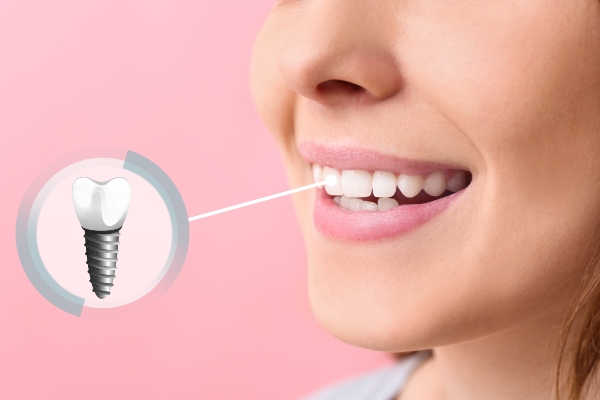 For anyone with damaged implants, it is important to know dental implant restoration is possible. While some issues may seem ignorable, no one should continue to wear damaged implants. Doing so can cause additional trauma and more severe health concerns. Continue reading to find out a few options to restore damaged implants.
For anyone with damaged implants, it is important to know dental implant restoration is possible. While some issues may seem ignorable, no one should continue to wear damaged implants. Doing so can cause additional trauma and more severe health concerns. Continue reading to find out a few options to restore damaged implants.
Loose dental implant
While dental implants typically have a high success rate, there is always a chance an issue might arise. One problem dental professionals see is a loose dental implant. This condition can occur when the implant never fully fuses to the jawbone. When the fusing process is not completed at the time of crown or denture attachment, the implant can loosen up over time. Also, because a strong, healthy jawbone is necessary for a stable implant, bone loss in the jaw can cause an implant to become loose. In either case, a replacement implant may be necessary.
Getting a replacement implant
Unfortunately, there is no easy way to replace an implant. The dental implant restoration process can take a prolonged period of time and up to four steps:
- Surgically remove the old implant
- Perform a bone graft on the jawbone
- Surgically insert new implants
- Attach replacement teeth
The healing time required between each step can be extensive, especially for patients who require a bone graft. Because of the time and investment necessary to replace a loose implant, it is crucial to have the entire mouth thoroughly examined before beginning the process. An issue with the gums or another tooth can lead to bone deterioration and implant trouble.
Cracked or missing crown
Many times a crown can be easily restored without affecting the implant. For others, the implant must be entirely replaced.
Repairing the crown
Damage such as a small chip or crack can often be repaired without having to remove the crown from the implant. This is the least invasive and quickest type of implant restoration. It can typically be performed in a single office visit, often without the need for any numbing agents.
Replacing the crown
If a crown has completely fallen out, it could be due to injury or abutment breakage. If the replacement tooth has not been lost, bring it to the dental appointment. In some cases, biting into hard food like ice or candy can cause injury to the crown. For others, a crown may fall out when an abutment is damaged. Because the abutment connecting the implant to the crown is thin, anything from head trauma to normal wear and tear can result in damage. Anytime the abutment is compromised, the entire crown typically needs to be replaced.
Check out what others are saying about our dental services on Yelp: Dental Implant Restoration in Weatherford, TX.
Conclusion
Despite the high success rate implants typically achieve, dental implant restoration may still be necessary. While a chipped or cracked crown may be a quick fix, a broken abutment can mean getting a completely new crown. A loose implant is usually the most complicated issue to restore and can involve replacing the entire implant.
Request an appointment or call Millar Family Dentistry at 817-885-5214 for an appointment in our Weatherford office.
Recent Posts
The dental implant process is lengthy and intricate. Therefore, patients must receive a thorough examination before embarking on the dental implant process. The dentist will check for abnormalities, sufficient amounts of healthy gum tissue and jawbone, and specific medical or lifestyle concerns. Fortunately, if any of these issues are present, some services can improve the…
Dental implants have become widely popular as a natural-looking tooth replacement solution. Not only do implants restore a patient’s full smile, but they also keep the jawbone engaged to prevent it from shrinking. However, they must be surgically implanted, which can bring some risks. Dive deeper into the pros and cons of dental implants to…
For many individuals with missing teeth, dental implants are an effective way to restore the appearance and function of their smile. However, like any medical procedure, there are potential risks and complications associated with getting dental implants. While these risks are relatively rare, it is important for patients to be aware of them before undergoing…


